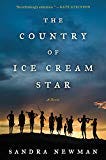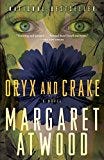Two Dystopian Fiction Books to Read if You're Wondering How the Coronavirus Plays Out
Posted by Bijal Shah on
Anything that threatens our existence, be it mild or rare always captures our imaginations and the coronavirus is no different. Whilst the majority can survive it, there’s always the threat of unknown unknowns that haunt us. Plus if you’re a parent, an elderly person or someone with a compromised immune system, you’re going to be that much more anxious.
As a bibliotherapist, who reaches out for fiction, for comfort, healing, rescue, I could not help but draw on 2 books that have fascinated me (and that made my list of Literature’s 13 Most Unusual Books) — both are about plague and disease which have taken root and hit the population hard. Both highly dystopian and extreme, there’ll be some comfort drawn from the fact that hopefully that’s not where we are heading. Or at least not just yet.
The first is The Country of Ice Cream Star by Sandra Newman

About a plague called ‘Posies’ that’s been killing people for generations before they hit the youthful age of twenty, the book is hauntingly dark, and starkly imaginative , landing you in a mindtrap about plagues, disease and viruses in a novel way. Motivated by her brother’s suffering of the disease, the book’s heroine, 15-year-old Ice Cream Star, sets off on a journey to save her world and search desperately for a cure. Given anyone alive is under twenty years old, she is faced with navigating herself through a world whose rules and structures are created by children. Unpredictable with the dystopian possibility that this world continues to remain ruled by children forever. Ambitious writing with its own invented dialect that narrates an ominous, ‘end-of-the-world’ story. Helpful tip — you may need to take notes due to the length of the book and the detail and dialect involved. If you’ve read and enjoyed Cloud Atlas, you’ll love this.
The second book is Margaret Atwood’s Oryx and Crake.

With a string of literary awards (nominee for the Man Booker Prize 2003, the Orange Prize for Fiction shortlist for 2004 and Scotiabank Giller Prize 2003) this Margaret Atwood novel, similar to her other works, also plays out a social dystopia that makes you feel this could so easily happen to our world; yet this novel in particular, is by far the most unusual and disturbing dystopia that Atwood has painted (yes more haunting than The Handmaid’s Tale).
A mass genetic experiment gone wrong courtesy of corrupt corporations, leads to the desensitisation of humans to violence and paedophilia — people seem to have lost all moral awareness of how immoral these are. People lose their creative abilities and have little concept of technology. The book narrates the story about Jimmy who could be the last man on the planet after a plague progressively wipes out humans. He grieves for his best friend Crake who dies and the woman they both love, Oryx. Time is fluid with Atwood switching from the past and present periodically and raises many philosophical questions, particularly around the human need to mess with genes that have evolved over millions of years.
Wherever we land with the Coronavirus, hopefully it doesn’t draw parallels with the stories above. At worst, there’s self-quarantine, no travel for a while, working from home, shortage of some supplies and enough water and soap to go around to wash our hands so that prevention accelerates its exit from humans. And hopefully, that should be comforting enough.
A big hello and thank you for reading! Passionate about literature, psychology, and life I launched Book Therapy as an alternative form of therapy using the power of literature. I create reading lists/personalised book prescriptions based on your individual needs, this is my signature personalised reading service. My book recommendations have featured in The Guardian, NBC News and Marie Claire. You can also check out Book Therapy’s free reading lists and A- Z of book prescriptions (covering both fiction and non-fiction). These suggest books based on your existing life situation (e.g. anxiety, job change, relationship heartache) as well as interests (e.g memoir, historical fiction, non-fiction, crime etc). There’s also a Children’s A — Z of Book Prescriptions. Feel free to check out the blog for more literary gems. There’s also a post on my personal story of how I entered the world of bibliotherapy and book curation. And if you’d like to connect, email me at bijal@booktherapy.io or www.booktherapy.io.
Book Therapy is a participant in the Amazon EU, US and Canada Associates Programme, an affiliate advertising programme designed to provide a means for sites to earn advertising fees by advertising and linking to Amazon.co.uk, Amazon.com and Amazon.ca
